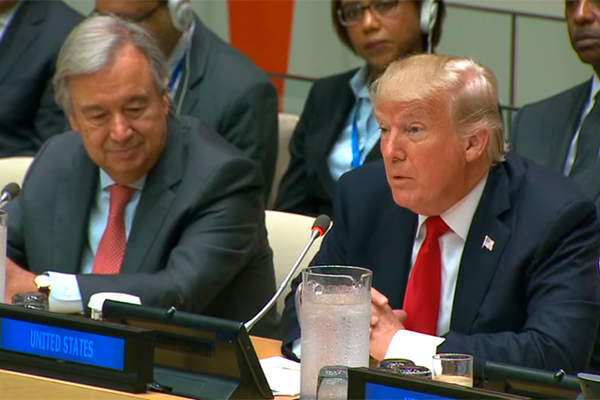Donald Trump’s election in November 2016 has sent shockwaves across the globe, especially among US allies and friends. The businessman and TV-personality had campaigned with a programme of disruption; he seemed determined to change America’s relationship with the world. Trump had been especially critical of US allies and it was unclear whether he was ready to maintain the system of extended deterrence the US had built over the last decades in Europe and Asia. In his view, previous US Presidents had cut ‘bad deals’ with the country’s allies. The conservative commentator Charles Krauthammer said about Trump’s inauguration speech: ‘What Trump pointed out… was a picture of a zero-sum world where what we have done for the world, they have been stealing from us’.
“The Trump revolution in foreign policy has not happened.”
And yet after eight months with Trump in office, US foreign policy is characterised not by disruption but by continuity. The Trump revolution in foreign policy has not happened. Instead, the Trump White House has largely stayed in line with established US foreign policy strategies. Trump’s criticism of NATO as ‘obsolete’ has not led to a major change in the US posture in Europe. The widely expected ‘grand bargain’ with Russia has not taken place, Ukraine has not been abandoned. The US has not placed its weight behind the UK in the Brexit negotiations, as some feared.
In Washington’s Middle East policy there is a lot continuity as well: there is no new US Syria policy, instead Washington has tried to work with Russia in the fight against ISIS just as the Obama Administration did; and neither has the Iran nuclear deal been jettisoned. Furthermore, there is no new China policy. Like Obama, Trump is rhetorically opposed to China’s new assertiveness but is doing nothing serious to try to stop Beijing’s slow-motion take-over of the South China Sea. Like his predecessors, Trump tries to encourage China to put serious pressure on North Korea, but like his predecessors he is having little success in doing so. Even in trade, where Trump may claim to have some first-hand expertise, there is no radical change. Trump has abandoned the plans for TTP, the Transpacific Partnership, and the Transatlantic Trade and Investment Partnership is on ice, but there is not much visible of a major re-adjustment of trade agreements towards an ‘America first’ agenda.
There are many reasons for this failure to change the course of US foreign policy. First, the US President, while having much more room for manoeuvre in foreign than in domestic policy, is not free to do as he wishes: confronted by a united, dedicated Congress, as in the question of how to deal with Russia, he faces a powerful counterweight. Secondly, the President needs a team that shares his vision and is determined to implement it. Herein lies a paradox: Trump has filled key positions with people who do not share his disruptive vision. Instead, Vice President Mike Pence, Secretary of Defence James Mattis, Secretary of State Rex Tillerson and National Security Advisor H.R. McMaster very much represent the political, economic and military establishment.
All of them subscribe to a traditional view of the US role in the world: America as the undisputed global leader and guarantor of the existing world order, holding back powerful challengers (China and Russia), combatting the anarchy and chaos that lead to the rise of terrorism (Syria, Afghanistan) and delivering global goods to allies and friends (security and a global trading system). Equally on the status-quo side in the Trump White House are Trump’s daughter Ivanka and his son-in-law Jared Kushner, who the right-wing press see as Trojan Horses of the Democrats.
Against this powerful group, which is determined to block Trump’s disruptive agenda and consolidate a ‘normal’ Republican administration, there was little the main advocate of a break with past policies, Steve Bannon, could do. The latter had been brought into the White House as Chief Strategist in order to set the Trump revolution in motion, or at least to keep alive the agenda that brought Trump to the White House. But both Bannon and his like-minded right-wing policy analyst Sebastian Gorka were forced to leave the White House in August in a clear confirmation that they had lost the struggle over the direction of the Trump Presidency.
“But even if there is no Trump revolution, the allies and friends of the US should be deeply worried.”
Bannon’s departure and the absence of concrete steps towards a revolution in US foreign policy have reassured the country’s allies and friends. While there remain massive doubts about Trump’s ability to handle crises, and while the world remains wary of a potential return of a more disruptive agenda, it appears that after a rocky start the Trump White House’s foreign policy is characterised by continuity, not by the kind of fundamental strategic re-orientation Trump seemed to advocate in his campaign and in some of his Tweets as a President.
But even if there is no Trump revolution, the allies and friends of the US should be deeply worried. The discontent with the American role in the world, the sense that the US bears the burden while others prosper at its expense, is widespread among the electorate and will not be dispelled with Trump. Many Americans doubt whether it is worth continuing to spend massive amounts of resources on an expansive global role. If the Trump Administration continues to play the traditional US role of global leader, responsible for global order, in the extensive way that Mattis or McMaster are pushing for, one day another Trump might be elected: a disruptor-in-chief who is indeed smart and professional and turns the radical rhetoric into reality.
That is why Europeans and other US allies must take Trump as a warning, even if the President fails to implement his agenda. The country’s allies must do much more for their own security and take on a greater responsibility for regional and global order themselves. The argument for America’s global engagement can only be won in the US itself if there is a new, fairer balance between the country and its allies.



